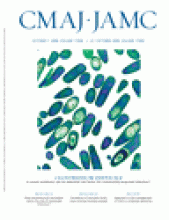- © 2008 Canadian Medical Association
No biological reason exists for the dramatic differences in health and life expectancy of people around the world, says the chair of the World Health Organization's Commission on Social Determinants of Health.
Instead, a toxic combination of poor social policies, unfair economic arrangements and bad politics can be blamed for most of the health inequities, says Sir Michael Marmot.
And around the world these inequities influence all classes. “There is a finely graded relation between people's social and economic circumstances and their health,” the epidemiologist told a press conference. “People in the middle have worse health than people at the top, but better health than those at the bottom.”
Worldwide, health inequities mean the risk of dying during pregnancy and childbirth is 1 in 17 400 in Sweden but 1 in 8 in Afghanistan, and that a child born in one Glasgow, Scotland, suburb can expect to die 28 years sooner than another born just 13 kilometres away.
The Commission's report, Closing the gap in a generation, health equity through action on the social determinants of health, released Aug. 28, 2008, is the culmination of 3 years of work by 19 commissioners, including Professor Monique Bégin, Canada's former federal health minister.
A homeless mother bathes her daughter using waste water from a building in Makati, Metro Manila, Philippines. Image by: Reuters / Romeo Ranoco
Key to the “closing the gap” goal is addressing the gender inequities that exist in all societies and improving the lives of girls and women, the report maintains. Access to education and sexual and reproductive health programs must be improved and legislation must make illegal discrimination on the basis of gender. Worldwide, average infant mortality rates are far higher for women with little education compared to those with secondary or higher education.
The report also takes aim at certain tax, trade and foreign aid policies; warns that globalization has beneficial but also disastrous impacts on health; and decries the commercialization of social goods such as education and health care. It notes:
-
Nordic countries have rates of poverty similar to Canada's before taxes and transfers are taken into account, but substantially lower rates after taxes and transfers.
-
Gross national product per capita more than doubled in donor countries from 1961 to 2002, while foreign aid per capita increased by less than 10% (to $67 per capita from $61).
-
Water tariffs increased by 200% when an international consortium was awarded a 40-year concession for the water and sanitation system in the third largest city in Bolivia.
-
When health care user fees were abolished in Uganda in 2001, national immunization rates more than doubled to 84%.
The marked failure of markets to supply vital goods and services equitably underscores the need for strong public sector leadership and adequate public expenditures, the report states.
Hence it supports a strong public sector that provides goods and services such as clean water and health care universally, regardless of the ability to pay. But Marmot says he was surprised by evidence of how much can be achieved by grassroots activism, as commission research illustrated that many governments act only after communities have led the way. Society has traditionally looked to the health sector to address health and disease concerns but most ministries of health pay no attention to understanding the sources of good health, arguing that it's not their business, (see sidebar), Marmot says.
Health ministries, Marmot adds, must become advocates within government to reduce health gaps in populations and argue for “health in all policies.”
Political dogma a major barrier to action on social determinants of health
“Ideological barriers” at the federal level will likely prevent the government from acting on key recommendations of the World Health Organization's report on the social determinants of health, although it could spark action in other parts of the world, says a distinguished Canadian physician.
The concept of equity from the start of life — which lies at the core of the Closing the Gap report — is clever, but “we don't have it here,” says Dr. Fraser Mustard, founder and former president of the Canadian Institute for Advanced Research, head of the Founders Network and a long-time advocate for early child development programs.
Prime Minister Stephen Harper “doesn't believe in it,” Mustard says.
The WHO report calls for a comprehensive approach to child development that facilitates early cognitive, social and emotional development.
But “ideologues believe that families should have full responsibility,” says Mustard, who promotes the creation of voluntary, community-based early child development programs.
One of the Harper government's first acts was to cancel the national child care and early learning program, negotiated largely by then-Liberal minister of social development Ken Dryden.
Mustard says that while the WHO report explains that early development affects learning throughout life, a shortcoming is that it doesn't emphatically make the case that failure to provide appropriate care and stimulus in the early years leads to a greater health burden later.
“Investment in early childhood is where all the dividends will come from,” agrees James Dunn, a research scientist at St. Michael's Hospital and Canadian Institutes for Health Research/Public Health Agency of Canada chair in applied public health.












